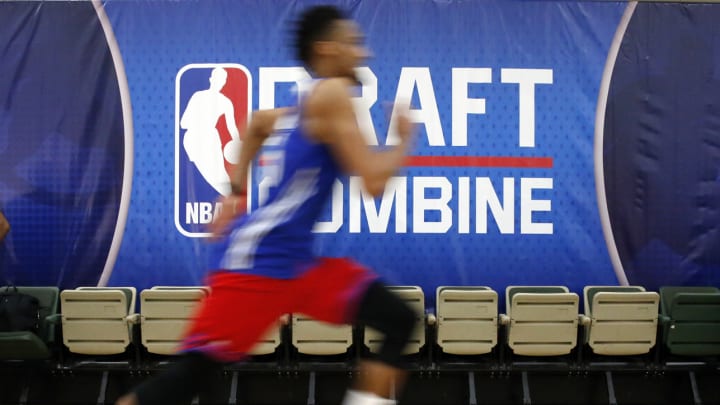Why high school players should be invited to the NBA draft combine

This story originally appeared in the May 15-22, 2017 issue of Sports Illustrated. Subscribe to the magazine here.
Malik Newman’s appearance at the NBA combine last May was, by itself, no surprise. The 6' 3" combo guard, out of Callaway High in Jackson, Miss., was a consensus top 10 recruit in the class of 2015. While Newman’s college of choice was a bit unconventional—he had interest from Kansas and Duke but selected Mississippi State, a school two hours up the road from his hometown—it was not a long-term play. Newman was a typical one-and-done prospect: Log a freshman season somewhere, then move on.
The irony? After his freshman season his pro prospects were dimmer than they had been coming out of high school. In his lone year at Starkville, Newman plainly disappointed: He averaged 11.3 points and shot a dismal 39.1% from the floor for a team that failed to reach the NCAA tournament. And the letdowns didn’t end there. Based on feedback from NBA scouts at the combine, Newman wound up withdrawing from the draft. (He never signed with an agent.) He announced that he would transfer to Kansas, where he sat out the 2016–17 season.
College players whose NBA draft decisions could hinge on their combine performance
There were plenty of reasons for Newman’s apparent regression: He had nagging toe and back injuries as a freshman; he says he played tentatively for fear of making mistakes. . . . The list goes on. But what if Newman had more information and guidance—better information and guidance—coming out of high school? How might that have helped him? What if the NBA pondered a different direction of its own: permitting select high school kids to attend the combine.
The one-and-done concept may be unfair and contrived, but it is a settled part of the NBA’s collective bargaining agreement. So why not acknowledge this reality and selectively open the combine to high school standouts who view time on college campus as a layover before taking off for the professional ranks?
The league already chooses combine attendees, so it would determine which freshmen-to-be merit a closer look, a bit of natural selection that would keep the numbers down. As any high school student knows, the party might sound awesome, but getting invited is usually the trickier piece. And while this group would remain ineligible to be drafted, it would receive essential feedback, much like college prospects who test the waters to determine what they need to work on. In this way, it’s a win for college hoops, as the next crop of one-and-done talent enrolls with a crystallized idea of how to improve and presumably is even more motivated to do so, having received an unvarnished checklist direct from the pros. (Yes, some college players will lose their combine spots, but that tells them all they need to know.)
The teams with the most on the line with remaining NBA draft decisions
The NBA, meanwhile, mines more data on prospective investments, which is never a bad thing. Likely one-and-done lottery picks Lonzo Ball, Josh Jackson and Jayson Tatum, among others, aren’t even attending the 2017 combine; they almost certainly would have last May as high schoolers. And it’s virtually assured that the league’s franchises will make crucial decisions on that caliber of player: A peek at nbadraft.net’s 2018 mock draft shows 11 current high school seniors among the top 15 available prospects.
A long college season certainly gives scouts and GMs plenty of information. A combine cameo is no windfall in that sense. But it’s an enhancement of the evaluation process nevertheless, done sooner rather than later.
Some, like Newman, may adjust their approach and expectations. Some may even pay more heed to their college coaches. So let a few high school luminaries look ahead and all sides—players, colleges, pro teams—benefit. Let everyone see the future in the present.
